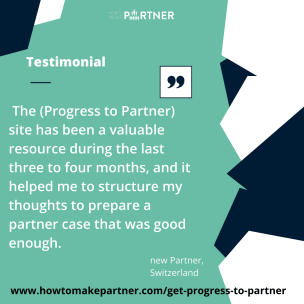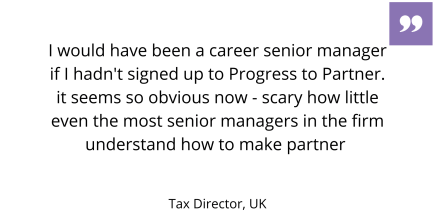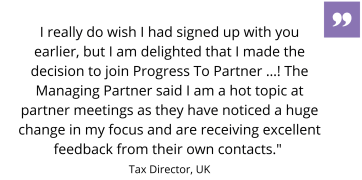Creating a persuasive and cast-iron Business Case for partnership in your law firm, consulting firm, Big 4, Accounting Firm or Magic Circle firm is probably the hardest part of making it through Partner Track into the partnership. In fact, the question we are most asked by senior managers, directors, and senior associates is how to create their own cast-iron Business Case for partnership.
In this blog post, you will find a round-up of all the articles about creating your Business Case for partner on our website, plus a sample of the resources available in my Progress to Partner Academy to help you create, articulate and pitch your Business Case for partner in your firm. sign up to my weekly newsletter here and you’ll find out what you need to be working on in your career development (and how to make the time for your career development) to progress your career in your firm.
How can Progress To Partner Academy help you with your Business Case?
With 14 self-study courses all aimed at people like you working in a law firm, accountancy firm or consulting firm, Progress to Partner Academy will give your the knowledge AND confidence to fly through this final step up to partner.
It’s like a Netflix for your career in the professions. Find what you need to watch or read when you need it. Within the site, you’ll find 14 self-study courses, 150+ videos, checklists, templates and plans to help you progress your career to partner. Amongst the many curated resources (no more unnecessary scrolling or searching), you’ll find:
- On-demand courses on how to create and articulate your business case, including our most downloaded course “How to Build a Cast-Iron Business Case for Partner”
- A section on the Partnership Admissions process with guides and recordings to help you find your way through the process with your sanity intact.
- Recordings, templates and checklists on how to ace your partner panel interview
- Proven advice on how to still do the day job and find the time to get through the Partner Track process
Find out more about Progress to Partner Academy and get started on building your partner-ready skills
Business Case for Partnership Articles

What is more important, your Business or Personal case for partnership? This post explains the difference between your Personal and Business case for partner. Hint – they are equally important!
6 tips to make your cast-iron Business Case so persuasive your partners have to say yes. This post contains the 6 tips and insights I gave to a highly successful consultant who was putting together his Business Case for his US-based consulting firm. It is an essential read if you are preparing to pitch your Business Case for partnership in a partnership panel interview.
One of our most sought-after courses in our Progress to Partner Academy is “How to Build a Cast-Iron Business Case for Partner”. We think it’s a must-have in your arsenal of tools and guidance to help with your career progression. There is also a section on the Partnership Admissions process with guides and recordings to help you find your way through the system. Check it out!
sign up to my weekly newsletter here and you’ll find out what you need to be working on in your career development (and how to make the time for your career development) to progress your career in your firm.you’ll find out what you need to be working on in your career development (and how to make the time for your career development) to progress your career in your firm.

3 key questions to answer in order to build up a cast-iron Business Case when you are currently in industry. Are you aiming to make partner by making a lateral move from industry? In this situation, demonstrating your ability to win work is the hardest part of creating your Business Case for partnership. This blog post gives you 3 key questions to help you show your potential for winning work.
a
Your Business Case for partnership: Don’t get over-fixated on your technical ability. This post discusses why your technical ability is not normally relevant to your Personal or Business Case for partnership.
What’s the emotional part of my Business case for partnership? When you go for partnership, you need more than just great numbers. You need to have the rest of your partners wanting to have and trust you as a member of their exclusive club.
What to do BEFORE starting to write your Personal and Business Case for partnership. This post explains that your Personal and Business Case for partnership is built up over months and years rather than days and weeks. The post gives you the groundwork you need to do as you create your Personal and Business case for partnership.
What do you need to put in your Business Case for partnership? This post sheds light on what exactly you need to create to build a cast-iron Personal and Business Case for partnership.

One of the most sought-after courses in our subscriber-only site Progress to Partner is called “How to Build a Cast-Iron Business Case for Partner”. We think it’s a must-have in your arsenal of tools and guidance to help with your career progression.
4 ways of building a powerful, Business Case for partner, if you are a non-fee earner. We’ve worked with many non-client-facing professionals who needed to put together a Business Case for partner. In this scenario, you can’t build a case based on the client work you will win. You need to think slightly more laterally about the advantage your partnership will gain if you make partner. Here are the 4 main threads that will strengthen any non-fee earner’s Business Case for partnership.
3 clever tips to help you build a Business Case for partner when you are working in industry. We are regularly contacted by people in industry, who are looking to make a career change and go for partner, for advice on demonstrating a cast-iron Business Case. They may have been in practice at some point in their career, but they lack the evidence for their Business Case that they can easily create a client following. However, most firms want to see in your Business Case how you will bring in new clients. In this blog post, we share three tips to help you build a strong case even if you have no track record of selling from your career in industry.








